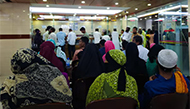AMRITSAR, India - It is lunchtime at what may be the world’s largest free eatery. The langar, or community kitchen, is located in this city’s glimmering Golden Temple, the holiest shrine of the Sikh religion. Thousands of volunteers have scrubbed the floors, chopped onions, shelled peas and peeled garlic. At least 40,000 metal plates, bowls and spoons have been washed and stacked. Anyone can eat for free here, and on a weekday, about 80,000 come.
On weekends, almost twice as many people visit. Each visitor gets a wholesome vegetarian meal, served by volunteers who embody India’s religious and ethnic mosaic. “This is our tradition,” said Harpinder Singh, the 45-year-old manager of this huge operation.
India is not only the world’s largest democracy, it also is one of the most spiritually diverse nations. It was born in a spasm of religious bloodshed in 1947 when British India was torn in two to create a Muslim homeland in Pakistan.
Yet India has been a resolutely secular nation and has managed to accommodate a vast range of views on such fundamental questions as the nature of humanity, the existence of God and the quality of the soul. Indeed, few places demonstrate so clearly the country’s genius for diversity and tolerance.
Sikhism, which emerged in the Punjab region of India in the 15th century, strongly rejects the notion of caste, which lies at the core of Hinduism. The Golden Temple, a giant complex of marble and gold that sits at the heart of this sprawling city near the border with Pakistan, seeks to embody this principle.
Nowhere is it more evident than in the kitchen, where everyone is considered equal. Guru Amar Das created the kitchen during his time as the third Sikh guru in the 16th century. Its purpose, he said, was to place all of humanity on the same plane, no matter his religion, wealth or social status.
Volunteerism and community support are other central tenets of Sikhism expressed in the langar. When the Mughal emperor Akbar tried to give Guru Amar Das a platter of gold coins to support the kitchen, he refused them, saying the kitchen “is always run with the blessings of the Almighty.” Ashok Kumar, a Hindu with a scraggly beard, has been volunteering at the kitchen almost every day for the past five years. “It is my service,” he explained. His job is to man the heavy bucket that receives the dirty plates and bowls.
Plates and bowls fly at him, but he never misses a beat, using a metal plate in each hand to deflect the traffic into the tub. Mr. Kumar used to be a bookbinder. “I feel happy here,” he said when asked why he had given up his old life. Indians of all faiths come here to find a measure of peace largely unavailable in the cacophony of the nation’s 1.2 billion people.
Like the thousands of pairs of shoes left at the temple gates, the chaos and filth of urban life are left at the marble entrances. The temple is a world of cleanliness and order - where the wail of the harmonium and the shuffling of bare feet are the only sounds, and every square centimeter is scrubbed many times a day.
It has not always been a peaceful place. A Sikh insurgency, which sought a separate homeland for Sikhs in Punjab, tore at India’s heart in the 1970s and ‘80s. In 1984, Indira Gandhi, then the prime minister, ordered a bloody raid on the temple. Hundreds of militants hiding there were killed.
The temple was also damaged. Sikh bodyguards later assassinated Mrs. Gandhi to avenge the attack. Despite this history, Sikhs remain resolutely a part of India’s mainstream, holding leading positions in the arts, government and business.
India’s current prime minister is a Sikh. Pankaj Ahuja, who owns a medical supply shop in Rajasthan, was visiting the temple for the third time, this time bringing his wife and son, who had never been before. They were sleeping in the pilgrims’ dormitories, which are also free. The family is Hindu, but the temple has a special significance for them.
“You have lots of religious places in this country,” said Mr. Ahuja’s wife, Nikita. “But the kind of peace and cleanliness you find here you won’t find anywhere else.” Indeed, she never gives a moment’s thought to who prepared the food in the kitchen, even though in India’s highly stratified caste traditions such matters are vital.
“It is more than food,” she said of the meals that she had eaten at the community kitchen. “Once you eat it, you forget who is cooking, who is serving it, who is sitting next to you.”
스마터리빙
more [ 건강]
[ 건강]이제 혈관 건강도 챙기자!
[현대해운]우리 눈에 보이지 않기 때문에 혈관 건강을 챙기는 것은 결코 쉽지 않은데요. 여러분은 혈관 건강을 유지하기 위해 어떤 노력을 하시나요?
 [ 건강]
[ 건강]내 몸이 건강해지는 과일궁합
 [ 라이프]
[ 라이프]벌레야 물럿거라! 천연 해충제 만들기
 [ 건강]
[ 건강]혈압 낮추는데 좋은 식품
[현대해운]혈관 건강은 주로 노화가 진행되면서 지켜야 할 문제라고 인식되어 왔습니다. 최근 생활 패턴과 식생활의 변화로 혈관의 노화 진행이 빨라지고
사람·사람들
more많이 본 기사
- [미주 한국일보 2026년 연중 기획 사업] 매년 풍성하고 유익한 행사… 올해도 한인사회와 함께
- 남궁옥분 “故 송도순, 열흘 전부터 혼수상태..큰 별 졌다”
- 새로운 여명… 이제 다시 희망이다
- 베네수엘라, 美압박에 맞서 미국인 구금…최소 5명 체포
- [새해 정치 풍향계… 2026 중간선거 전망] 트럼프 2기 중간평가의 시간… 민심은 어디로
- 2026 북중미 월드컵에서 사용될 공인구는 ‘트리온다’
- [2026 북중미 월드컵 상금은] 6억5천만달러 ‘돈 잔치’… 우승하면 5천만달러
- 16개 경기장 면면은… LA 소파이 스테디엄에 ‘뜨거운 함성’ 몰려온다
- “박나래 술잔에 맞아 4바늘 꿰매”..전 매니저, 경찰에 상해진단서 제출
- 유승민, ‘李정부 총리 제의설’ 확인… 1
- 진태현♥박시은, 임신 시도 중단.. “2세 계획, 가슴 무너지지만 멈춰야”
- LA 올림픽, 도시 전체가 경기장… 한인타운 인근서도 경기
- 이혜훈 ‘보좌진 갑질’ 녹취 폭로…국… 2
- 워싱턴북한선교회, 통일선교연합기도회
- 경희대 워싱턴동문회 송년모임
- 평통 미주지역회의, 워싱턴 시민단체와 연대
- 첫 무슬림 뉴욕시장 맘다니 취임…쿠란 위에 손 얹고 선서
- 식당 가면 4% 음식세 더 내야
- [미리 보는 2028년 LA 하계올림픽] 역대 최대 규모… LA, 전 세계 스포츠 ‘메카’로
- AOA 출신 권민아, 의식 회복→충격적 글·사진 삭제.. “눈앞에서 사라질 것”
- 재외동포, 2년 새 7만5천명 줄었다…181개국에 700만 명 거주
- VA, 새해부터 스팸 전화·문자 강력 규제
- 한인 음악인들 ´희망의 선율´ 병오년 새해 밝힌다
- 미국·캐나다·멕시코, 2026 북중미 월드컵의 모든 것… ‘축구 대제전’ 전 세계 이목 미국으로
- 코스트코행 40만달러 랍스터 도난당해...‘스푸핑, 위장트럭’까지…워싱턴주 등 미 화물절도 극성
- 브라이언트팍서 외국인 관광객 묻지마 칼부림
- 말리·부르키나파소 “미국인 오지마”…美입국 금지에 맞불
- 지방세 공제한도 1만→4만달러로 상향 1
- 60년만에 은퇴하는 ‘오마하의 현인’ 버핏…누적 수익률은 610만%
- “추신수는 지울 수 없는 발자취 남겼다” 美 야구기자, 명예의 전당 투표서 ‘CHOO 선택’ 이유 밝혔다
- 中왕이 “日일부세력, 역사 후퇴 시도…韓, 올바른 입장 취해야”
- 뉴욕증시 주요지수 3년 연속 상승…S&P500 연간 16%↑
- [말띠 독자들의 새해 소망·다짐] ‘붉은 말’처럼 역동적으로… 힘찬 도약과 성취를
- 불체자 의심 메디케이드 정보 공유 허용
- “AI·소비가 경제 ‘버팀목’… 금리인하로 주택시장 반등”
- [새해 암호화폐 시장은 어디로- 현황과 전망] “낙폭 뒤의 기회” vs.“불확실성 당분간 지속될 것”
- [2026 중간선거 - 뛰는 한인 정치인들] 한인 정치력 신장… 캘리포니아서 도약 이끈다
- ‘억’ 소리 나는 ‘개념 부부’..신민아♥김우빈·손예진♥현빈
- 낸시랭, 사채 빚 15억 떠안았다..오열 고백 “좀비떼처럼 뜯어 먹어”
- 미국 정부, TSMC에도 美반도체장비 中공장 반입 허가
- “트럼프 리조트의 마사지사들, 엡스타인에 방문 서비스 제공”
- 시애틀 다운타운 상권 명암 엇갈려...의류할인점 ‘로스’ 폐점, 노스트랙 이전
- NYPD 무력 사용 역대급 증가
- 트럼프 “시카고·LA 등서 軍철수…범죄늘면 더 강하게 재배치”
- 오픈AI 직원, 올해 평균 150만 달러치 주식 받아…역대 빅테크 최고
- 그레잇넥교회, 더나눔하우스에 후원금
- 美국무부 “韓정통망법에 중대 우려…美플랫폼기업에 부정적”
- 조세호 ‘조폭 연루설’ 털고 빠른 복귀 수순.. ‘도라이버’ 시즌4 합류
- 이명석 회장, “공금횡령^불법행위 한적 없다“
- 홀인원-MD 80세 오차환 씨
1/5지식톡

-
 미 육군 사관학교 West Poin…
0
미 육군 사관학교 West Poin…
0https://youtu.be/SxD8cEhNV6Q연락처:wpkapca@gmail.comJohn Choi: 714-716-6414West Point 합격증을 받으셨나요?미 육군사관학교 West Point 학부모 모…
-
 ☝️해외에서도 가능한 한국어 선생님…
0
☝️해외에서도 가능한 한국어 선생님…
0이 영상 하나면 충분합니다!♥️상담신청문의♥️☝️ 문의 폭주로 '선착순 상담'만 진행합니다.☎️ : 02-6213-9094✨카카오톡ID : @GOODEDU77 (@골뱅이 꼭 붙여주셔야합니다…
-
 테슬라 자동차 시트커버 장착
0
테슬라 자동차 시트커버 장착
0테슬라 시트커버, 사놓고 아직 못 씌우셨죠?장착이 생각보다 쉽지 않습니다.20년 경력 전문가에게 맡기세요 — 깔끔하고 딱 맞게 장착해드립니다!장착비용:앞좌석: $40뒷좌석: $60앞·뒷좌석 …
-
 식당용 부탄가스
0
식당용 부탄가스
0식당용 부탄가스 홀세일 합니다 로스앤젤레스 다운타운 픽업 가능 안녕 하세요?강아지 & 고양이 모든 애완동물 / 반려동물 식품 & 모든 애완동물/반려동물 관련 제품들 전문적으로 홀세일/취급하는 회사 입니다 100% …
-
 ACSL 국제 컴퓨터 과학 대회, …
0
ACSL 국제 컴퓨터 과학 대회, …
0웹사이트 : www.eduspot.co.kr 카카오톡 상담하기 : https://pf.kakao.com/_BEQWxb블로그 : https://blog.naver.com/eduspotmain안녕하세요, 에듀스팟입니다…
케이타운 1번가
오피니언
 정숙희 논설위원
정숙희 논설위원샴페인, 마지막 날과 첫날을 위하여
 조지 F·윌 워싱턴포스트 칼럼니스트
조지 F·윌 워싱턴포스트 칼럼니스트 [조지 F. 윌 칼럼] 저무는 2025년에 안도의 한숨
 김동찬 시민참여센터 대표
김동찬 시민참여센터 대표 [미국은 지금] 책임 있는 자본 없으면 커뮤니티 미래도 없다
 성영라 수필가 미주문협 부이사장
성영라 수필가 미주문협 부이사장 [수요 에세이] 다시, 제자리로 돌아와서
 신경립 / 서울경제 논설위원
신경립 / 서울경제 논설위원 [만화경] 경영자의 ‘문제적’ 사과
 문태기 OC지국장
문태기 OC지국장 한인 정치력 업그레이드 기대
 민경훈 논설위원
민경훈 논설위원세계 역사를 바꾼 동물
 박홍용 경제부 차장
박홍용 경제부 차장 한인사회가 주목해야 할 새해 경제
 박영실 시인·수필가
박영실 시인·수필가 [화요칼럼] 피드백
1/3지사별 뉴스

지방세 공제한도 1만→4만달러로 상향
2026년 새해에도 뉴욕과 뉴저지 한인들의 일상에 크고 작은 영향을 미치는 다양한 규정과 법규가 새롭게 바뀌게 된다. 당장 1일부터 뉴욕시 최…
■ 사고- 한동대·뉴욕한인청소년센터 국제여름캠프

식당 가면 4% 음식세 더 내야
2026년 1월1일부터 페어팩스 카운티 내 모든 음식점과 레스토랑에서 4%의 음식세(Food and Beverage Tax)가 새롭게 부과된다…
VA, 새해부터 스팸 전화·문자 강력 규제

‘붉은 말의 해’ 열리다
‘붉은 말의 해’를 알리기 위해 서울에서는 제야의 종이 울리고 부산에서는 화려한 드론쇼가 펼쳐지는등 세계 각국에서 새해를 맞이했다. 2026년…
권혁인 목사 /UMC 한인총회장 /산타클라라 연합감리교회

오늘 하루 이 창 열지 않음 닫기 




















































.png)


댓글 안에 당신의 성숙함도 담아 주세요.
'오늘의 한마디'는 기사에 대하여 자신의 생각을 말하고 남의 생각을 들으며 서로 다양한 의견을 나누는 공간입니다. 그러나 간혹 불건전한 내용을 올리시는 분들이 계셔서 건전한 인터넷문화 정착을 위해 아래와 같은 운영원칙을 적용합니다.
자체 모니터링을 통해 아래에 해당하는 내용이 포함된 댓글이 발견되면 예고없이 삭제 조치를 하겠습니다.
불건전한 댓글을 올리거나, 이름에 비속어 및 상대방의 불쾌감을 주는 단어를 사용, 유명인 또는 특정 일반인을 사칭하는 경우 이용에 대한 차단 제재를 받을 수 있습니다. 차단될 경우, 일주일간 댓글을 달수 없게 됩니다.
명예훼손, 개인정보 유출, 욕설 등 법률에 위반되는 댓글은 관계 법령에 의거 민형사상 처벌을 받을 수 있으니 이용에 주의를 부탁드립니다.
Close
x